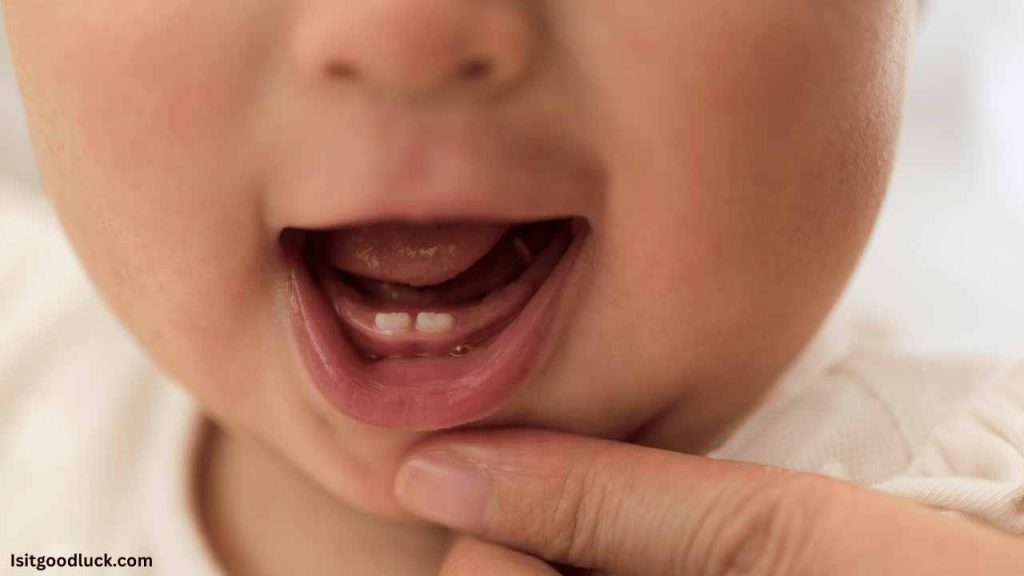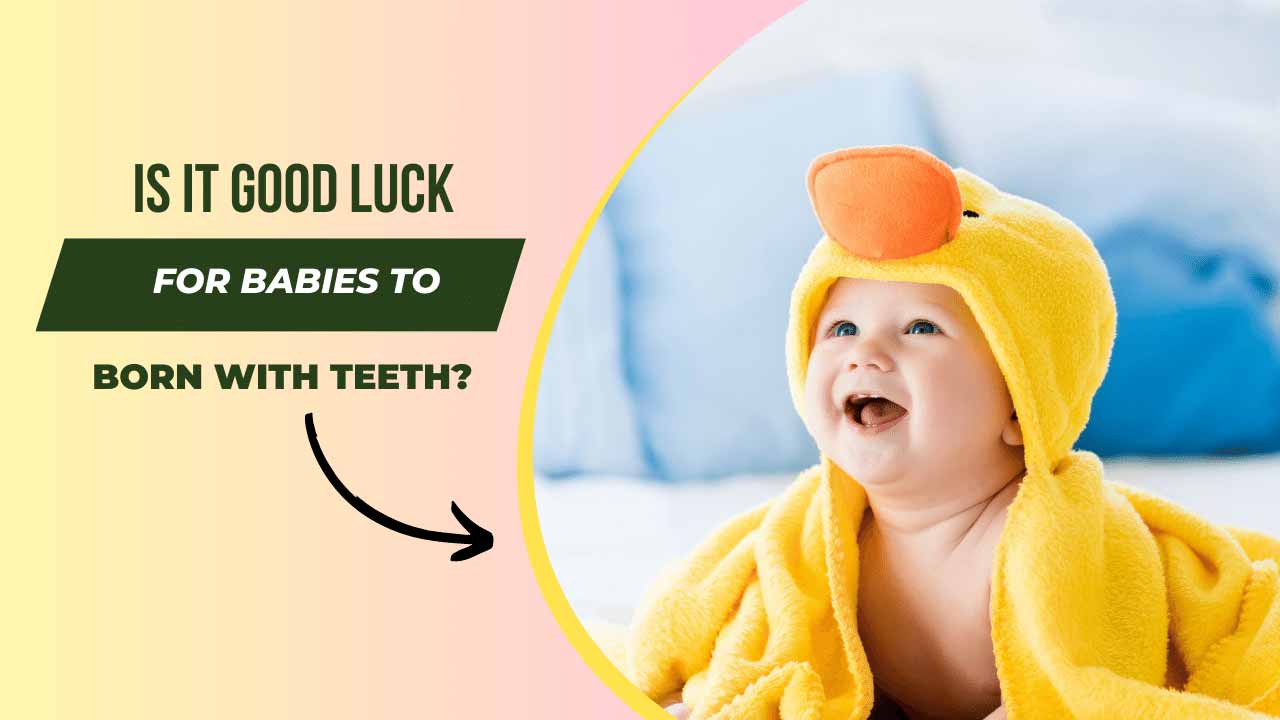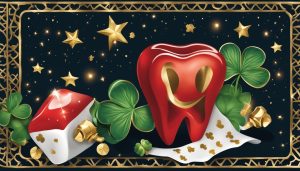Natal teeth, an occurrence as fascinating as it is rare, refer to teeth that are already present at a baby’s birth. Although only approximately 1 out of every 2,000 babies is born with these teeth, the phenomenon has captivated the imagination for centuries.
Different cultures have attributed varying degrees of luck to these babies. While some believe these children are destined for greatness and prosperity, others consider them harbingers of misfortune.
However, a question lingers: Is there any scientific evidence supporting these beliefs, or is this merely the world of folklore and superstitions?
Contents
- 1 Cultural Perspectives on Natal Teeth: A Spectrum of Beliefs
- 2 Unraveling the Mystery: Causes of Natal Teeth
- 3 The Potential Hazards: Complications of Natal Teeth
- 4 Dealing with Natal Teeth: Treatment Options
- 5 Deciphering the Lore: Superstitions and Folklore
- 6 Conclusion: Is it Good Luck for Babies be Born with Teeth?
- 7 FAQs
- 7.1 Is there any scientific backing to the belief that natal teeth bring good luck?
- 7.2 What should parents do if their baby is born with teeth?
- 7.3 Is there any way to predict if a baby will be born with teeth?
- 7.4 How common is it for a baby to be born with teeth?
- 7.5 Do natal teeth indicate any future dental problems?
Cultural Perspectives on Natal Teeth: A Spectrum of Beliefs
In many societies, particularly in England, a baby born with teeth symbolizes a potential world conqueror.
The Malaysians, likewise, view this as a good omen predicting a long and prosperous life. Conversely, some cultures interpret this phenomenon rather pessimistically.
In China, for instance, such babies are considered bringers of misfortune to their families.
Despite the polarity of these beliefs, they all converge on one point: the idea that natal teeth carry a more profound, often metaphysical, significance.
Unraveling the Mystery: Causes of Natal Teeth
Despite scientific advancements, the exact cause of natal teeth remains an enigma. Researchers, however, have identified several potential factors contributing to this rare condition:

- Premature birth: Babies born prematurely are more likely to develop natal teeth. This may be due to developmental irregularities associated with preterm birth.
- Low birth weight: Low birth weight is also associated with an increased likelihood of natal teeth.
- Cleft lip or palate: These physical deformities often coincide with natal teeth, suggesting a connection.
- Genetic disorders: Certain inherited conditions, such as Pfeiffer and Hallermann-Streiff syndrome, are associated with natal teeth.
- Maternal medications: Certain medications taken by the mother during pregnancy might influence the occurrence of natal teeth, although this connection is not fully understood.
Also read: Is it good luck to see double numbers?
The Potential Hazards: Complications of Natal Teeth
In most instances, natal teeth pose no significant complications. However, specific scenarios necessitate careful attention, including:
- Injury: Natal teeth may cause damage to the baby’s tongue or gums, particularly during feeding.
- Feeding difficulties: The presence of natal teeth might interfere with breastfeeding or bottle-feeding.
- Swallowing issues: Babies with natal teeth may experience trouble swallowing, leading to potential nutritional concerns.
- Choking hazard: Loose natal teeth pose a choking risk.
- Infections: If not correctly cared for, natal teeth can become a breeding ground for bacteria, leading to oral diseases.
Dealing with Natal Teeth: Treatment Options
Usually, natal teeth require no specific treatment. However, if these teeth lead to the abovementioned complications, their removal may be necessary.
The decision to remove or retain these teeth is made individually, considering the baby’s overall health, the parents’ comfort, and the potential risks.
Deciphering the Lore: Superstitions and Folklore
Natal teeth have inspired an intriguing array of beliefs. Here are a few examples:
- Luck and misfortune: Depending on cultural perspectives, babies born with teeth are either incredibly lucky or disastrously unlucky.
- Lifespan: Some believe these babies will either enjoy a long life or face a short one.
- Strength: Natal teeth are sometimes considered a sign of future strength or weakness.
- Success: The presence of these teeth is believed to determine whether a child will lead a successful or unsuccessful life.
Despite the pervasiveness of these beliefs, it is essential to note that they lack scientific backing. However, they continue to be part of our cultural and historical tapestry, passed down through generations.
Conclusion: Is it Good Luck for Babies be Born with Teeth?
The phenomenon of natal teeth is a rare and largely misunderstood condition. While it might cause minor complications, in most cases, it is harmless and requires no treatment.
The superstitions and folklore surrounding this condition are as diverse as they are fascinating. Still, they need to be verified by scientific data.
Whether you view natal teeth as a sign of good luck, a portent of misfortune, or simply an exciting anomaly is ultimately a personal choice.
What’s most important is understanding the actual implications of this condition and knowing when medical intervention is necessary.
Natal teeth don’t determine a baby’s destiny; they merely add an intriguing facet to the miracle of birth.
Also read other articles regarding baby good luck
FAQs
Is there any scientific backing to the belief that natal teeth bring good luck?
No, no scientific evidence supports the belief that babies born with teeth are luckier than those without. This belief largely stems from cultural folklore and superstitions. While some cultures view natal teeth as a sign of good fortune, others perceive it as an omen of bad luck.
What should parents do if their baby is born with teeth?
First and foremost, parents should consult a pediatric dentist. Although natal teeth often don’t require treatment, in some cases, they may cause complications such as injury to the baby’s tongue or difficulty feeding. If the teeth are loose, there’s also a risk of choking. A pediatric dentist can assess the situation and provide the best advice for your baby’s needs.
Is there any way to predict if a baby will be born with teeth?
There’s no reliable way to predict if a baby will be born with teeth. Natal teeth are rare, and the causes aren’t entirely understood. However, some risk factors have been associated with natal teeth, including premature birth, low birth weight, genetic disorders, and specific medications taken during pregnancy.
How common is it for a baby to be born with teeth?
The occurrence of natal teeth is relatively rare. Approximately 1 in every 2,000 newborns has natal teeth at birth. The condition is slightly more common in girls than boys and often runs in families, suggesting a possible genetic component.
Do natal teeth indicate any future dental problems?
No, natal teeth do not indicate that a child will have dental problems in the future. Natal teeth are not related to a child’s primary teeth, which usually appear around six months of age. However, parents should still ensure that their child’s oral health is maintained, regardless of whether or not they were born with teeth.





